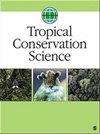卡拉克穆尔生物圈保护区生产活动对森林覆盖变化的影响:证据与研究空白
IF 1.6
4区 环境科学与生态学
Q2 BIODIVERSITY CONSERVATION
引用次数: 2
摘要
背景与研究目的人类活动为了满足各种需要,导致了森林砍伐和其他森林覆盖变化过程。自然保护区是控制森林损失的最有效手段之一。保育带来的补偿不足以与经济租金较高的土地用途竞争,例如采伐木材和粮食生产。本研究总结了墨西哥卡拉克穆尔生物圈保护区生产活动引起的森林过程的证据,并确定了研究空白。方法系统地回顾了研究卡拉克穆尔地区(包括过渡带)生产活动引起的森林过程的科学文献。我们计算了整个样本中森林过程和生产活动的代码频率(53),评估了每个代码在定性综合和解释中的重要性,并总结了仅考虑初级研究的森林过程测量结果(46)。结果森林砍伐是最常见的调查过程。传统农业最初造成了森林砍伐,而随着农业集约化政策的实施,畜牧业和传统农业近年来逐渐占据主导地位。很少有文章调查了因休耕缩短和选择性采伐而稳步增加的森林退化。此外,很少有研究查明长休耕和核心区划界造成的森林恢复。没有出版物评价可持续倡议对森林覆盖的影响。结论在区域尺度上量化森林砍伐的趋势掩盖了其他森林过程的存在。卡拉克穆尔的农村发展方案不包括环境方面的考虑,而对可持续发展倡议的参与程度也很低。对地方一级生产活动的了解将有助于区分森林的长期动态和临时动态。为了确保Calakmul的弹性和包容性增长,应该为减少影响的伐木、可持续农业集约化、改善休耕和养蜂提供资金支持,以支付不可持续的牲畜养殖和工业化农业的交易成本。本文章由计算机程序翻译,如有差异,请以英文原文为准。
Impact of Productive Activities on Forest Cover Change in the Calakmul Biosphere Reserve Region: Evidence and Research Gaps
Background and Research Aims Human activities seeking to satisfy various needs have resulted in deforestation and other forest cover change processes. The Natural Protected Areas are among the most efficient instruments to contain forest loss. The compensation from conservation is not sufficient to compete with land uses with higher economic rent, such as timber extraction and food production. This study summarizes the evidence and identifies research gaps on forest processes caused by productive activities in Mexico’s Calakmul Biosphere Reserve. Methods We systematically reviewed the scientific literature investigating forest processes caused by the productive activities in the Calakmul, including the transition zone. We calculated the frequencies of codes on forest processes and productive activities in the entire sample (53), evaluated each code’s significance in the qualitative synthesis and interpretation, and summarized the measurements of forest processes considering only the primary studies (46). Results Deforestation was the most commonly investigated process. Traditional agriculture initially caused deforestation, while livestock and conventional agriculture became more dominant recently with the agricultural intensification policies. Few articles investigated forest degradation experiencing a steady increase from fallow shortening and selective logging. Also, few studies identified forest recovery resulting from long fallows and core zone delimitation. No publications evaluated the forest cover impact of sustainable initiatives. Conclusion The tendency to quantify deforestation on a regional scale masks presence of other forest processes. The rural development programs in Calakmul did not include the environmental perspective, while participation in sustainable initiatives was low. The understanding of productive activities at the local level will allow differentiation of the long-term from temporary forest dynamic. Implications for Conservation To assure resilient and inclusive growth in Calakmul, the reduced-impact logging, sustainable agricultural intensification, improved fallows, and beekeeping should be supported with monetary resources that cover the transaction costs of unsustainable livestock breeding and industrial agriculture.
求助全文
通过发布文献求助,成功后即可免费获取论文全文。
去求助
来源期刊

Tropical Conservation Science
BIODIVERSITY CONSERVATION-
CiteScore
3.60
自引率
5.90%
发文量
16
审稿时长
>12 weeks
期刊介绍:
Tropical Conservation Science is a peer-reviewed, open access journal that publishes original research papers and state-of-the-art reviews of broad interest to the field of conservation of tropical forests and of other tropical ecosystems.
 求助内容:
求助内容: 应助结果提醒方式:
应助结果提醒方式:


